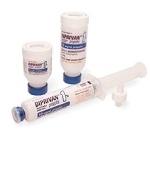by
Robert Garment, Executive Editor | April 03, 2006

Concerns raised over how
Propofol is administered
HARRISBURG: Problems associated with the use of a sedation drug called propofol (PRO-pa-fall) have raised concerns about how the drug is administered and monitored, according to an article published in the March 2006 issue of the Patient Safety Advisory.
Use of propofol during endoscopic, radiologic and other procedures in hospitals, ambulatory surgical facilities and physician offices is growing around the country, including in Pennsylvania, because propofol works faster than other sedation drugs to sedate the patient and leaves the patient sedated for a shorter period of time. It also has fewer side effects like nausea and vomiting, and it allows the patient to wake up, recover and return to routine activities and diet sooner than other sedation drugs.
However, recent reports submitted to the Patient Safety Authority show that, in untrained hands, propofol can be deadly. The Pennsylvania Patient Safety Reporting System (PA-PSRS) has received over 100 reports in which the use of propofol has been cited. Sixteen percent of these reports have been classified as Serious Events, including four patient deaths in which propofol may have played a role. In many cases, the events show that the practitioners involved in administering the drug were not fully trained in the use of propofol and other heavy sedation drugs.



Ad Statistics
Times Displayed: 47606
Times Visited: 1355 Ampronix, a Top Master Distributor for Sony Medical, provides Sales, Service & Exchanges for Sony Surgical Displays, Printers, & More. Rely on Us for Expert Support Tailored to Your Needs. Email info@ampronix.com or Call 949-273-8000 for Premier Pricing.
"The question `Who should administer propofol?' is not easily answered," said Alan B. K. Rabinowitz, administrator of the Patient Safety Authority, "since several respected professional medical associations disagree with other, equally respected professional associations on protocols governing the administration and monitoring of the drug."
The article notes that the American College of Gastroenterology, American Society for Gastrointestinal Endoscopy and the Society of Gastroenterology Nurses and Associates, for example, endorse nurse-administrated propofol, consistent with state regulations, if the nurse is trained in the use of such drugs and is capable of resuscitating patients from general anesthesia or severe respiratory depression. On the other hand, the American Society of Anesthesiologists, American Association of Nurse Anesthetists and the American Association of Ambulatory Surgical Facilities do not agree and have stricter guidelines for use of propofol and similar sedation drugs.
"Since propofol has fewer side effects than other sedation drugs, some experts fear that practitioners are developing a false sense of security about the risks of the drug," Rabinowitz said. "Practitioners who are not trained to administer drugs that cause deep sedation and general anesthesia are being given permission to administer propofol, which our analysis shows can put the patient in jeopardy and even cause death."
The article, entitled "Who Administers Propofol in Your Organization?", includes several safe strategy practices that facilities can follow to minimize the risk involving propofol and other sedation drugs.

